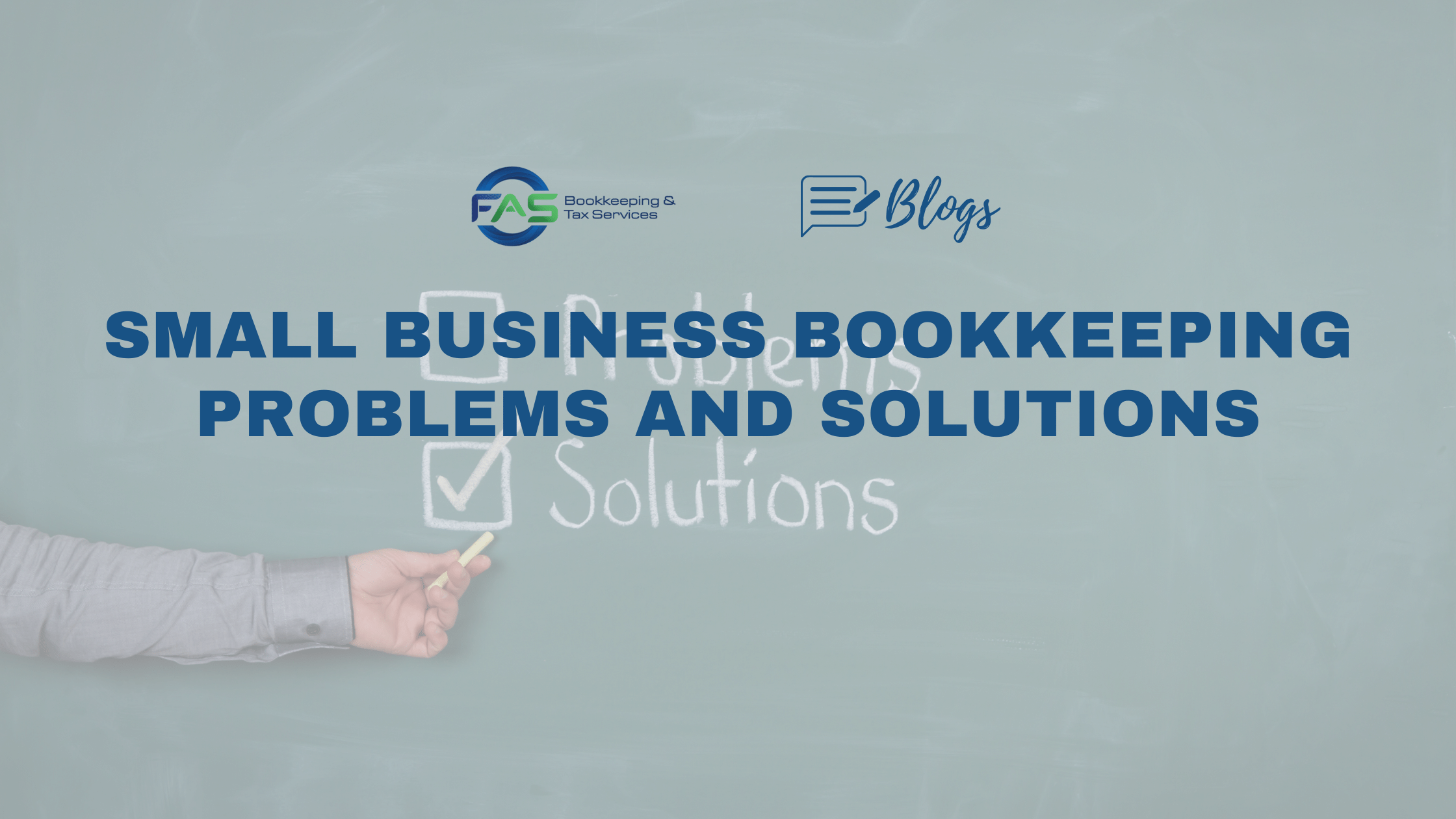Small Business Bookkeeping Problems and Solutions
If you own a small business, then you know the feeling of being pulled in a million different directions and one of those directions might be bookkeeping problems. However, it’s vital that you pay attention to the financial aspects of your company and find solutions to your bookkeeping problems. Otherwise, you may miss out on opportunities to maximize your profits, and you could end up making costly mistakes. Especially if you don’t find a solution for your bookkeeping problems.
So, how can you make sure that this doesn’t happen? Are there ways to protect yourself from common bookkeeping pitfalls? Yes! Check out these common bookkeeping problems and solutions so you can avoid costly mistakes and excel at your business.
[lwptoc depth=”6″ hierarchical=”0″ numeration=”none” numerationSuffix=”none” title=”Table of Contents” toggle=”0″ smoothScroll=”1″ smoothScrollOffset=”200″ width=”auto” titleFontSize=”default” colorScheme=”light”]
 Bookkeeping Problem #1: Incorrect Bookkeeping
Bookkeeping Problem #1: Incorrect Bookkeeping
When it comes to bookkeeping, small businesses sometimes get the short end of the stick. As a small business owner or manager, you’re expected to know everything and do everything. And when it comes to proper bookkeeping, it’s no different. You need to keep close tabs on your finances, but you also need to understand what records are included in your bookkeeping process and why they’re important.
All businesses need to keep proper financial records. It’s especially important for small businesses to keep a close watch on their documentation so that transactions are well-documented.
The main reason small businesses fail to maintain proper records is that they don’t have time or know which documents to track. Failing to maintain proper records becomes a much larger bookkeeping issue when tax season rolls around.
Bookkeeping Solution: Establish bookkeeping procedures to stay organized
It’s important to have the right information ready so that you can be prepared for what might come up. Here are some of the documents businesses typically track:
- Purchases and Expenses
All purchases and expenses must be filed for tax purposes. This includes everything you purchase or spend money on and any appropriate forms or receipts you possess. You should keep these documents for at least three years from the tax year in which you file your income taxes.
- Employment Tax Records
To ensure you are in compliance with IRS regulations, please keep a log of all employee details and payments. Include employee names, addresses, social security numbers, dates of employment, absences, and all income tax withholding allowance certificates.
- Cash Flow
To keep better track of your finances, it’s a good idea to get a receipt or invoice for any income you receive. Then add that information to your accounting system, and keep a copy as confirmation.
- Assets
Sale of business assets, purchase of business assets, and depreciation of business assets are three items that are important to recordkeeping for your business. If you sell an asset for more than you paid for it, it is often a taxable event.
 Bookkeeping Problem #2: Wrong data entry
Bookkeeping Problem #2: Wrong data entry
When JP Morgan Chase took a $6.2 billion trading loss in 2012, the company quickly conducted an internal investigation to find the cause. They found that the faulty risk model used by the company’s traders had been operating through a series of Excel spreadsheets that had to be completed manually through a process of copying and pasting data from one spreadsheet to another.
These days, despite improvements in technology over the last 30 years, this kind of human error is still all too common. More than a quarter of professionals (27.5%) reported that inaccurate data had been manually input into an enterprise system at their firms, according to the software products team at Bloomberg.
The consequences can be serious: Errors can lead to extremely expensive bookkeeping issues, especially when they lead the company to make bad business decisions or issue an improper forecast.
Bookkeeping Solution: Create a system of checks and balances
You’re probably aware that human error is unavoidable. But while it’s one thing to make a mistake in your personal life, making an error in a business can have serious financial consequences. In fact, the more complex regulatory and compliance requirements become, the riskier it is for everyone to have access to all parts of a business.
If you’re not proactive about identifying and resolving problems, you’ll never get ahead. Set aside some time to review your data and identify weak areas or past mistakes. Start by focusing on these areas first, and then build a robust plan with checks and balances.
 Bookkeeping Problem #3: Miscalculated cash flow
Bookkeeping Problem #3: Miscalculated cash flow
As a business owner, you’re probably familiar with the term “cash flow”. It’s the amount of money going in and out of your business, and poor cash flow can spell doom for the future of your business.
One way to avoid that doom is to predict your business’s cash flow—and to know how much money you will earn and spend (on growing your business and beyond).
But it turns out that this can be easier said than done. According to a survey by Insights West, nearly half of small business owners consider profit and cash flow their main source of stress. And according to a study by U.S. Bank, 82 percent of businesses fail due to cash flow mismanagement.
Bookkeeping Solution: Revisit your cash flow projections regularly
Cash flow projections can look very different from the actual numbers you’re seeing. In fact, this is a common problem for small businesses. The best way to combat this issue is to revisit your cash flow projections every few months, and to pay close attention to any discrepancies you might find. If there’s a large difference between what you projected and what actually happened, you can use that knowledge to make better projections in the future and keep your business on track.
You should aim to project no farther than 12 months into the future because there are too many variables at play beyond that point—the economy could dip, or a new competitor could open up shop down the street. Make sure your business is projecting its cash flow monthly, whether that means delegating this task to your bookkeeper, using basic accounting software, or tracking it yourself.
 Bookkeeping Problem #4: Undervalued time and effort
Bookkeeping Problem #4: Undervalued time and effort
We know that many small business owners spend their time doing their own bookkeeping. We understand that sometimes it can seem easier to just do it yourself: you know your business, and keeping track of everything feels like a natural part of the work.
But what’s the cost?
Time is money. It’s a phrase we’ve all heard before—but few business owners place enough value on their own time. How much of your time is lost to payroll, bookkeeping, and issues surrounding them? This is time that you could have spent training your employees, networking or building your business. And then there are mistakes – small bookkeeping errors result in big fines. Mistakes are easy to make when you do your own bookkeeping, and they can be costly in the long run. We believe that your time is valuable, and we want to help you save it!
Bookkeeping Solution: Hire a bookkeeping professional
We get it-you’re busy. Your time is valuable, and there are some things you just have to do yourself. But when it comes to managing your finances and bookkeeping, you’re probably better off handing that task over to the professionals.
Bookkeeping can be tedious, time-consuming, and downright boring (not to mention stressful!). If you’re not a bookkeeper or financial expert, it can seem like a huge waste of your time and energy. Why not hire someone whose sole job is knowledge of accounting standards and keeping up with all the regulations?
One of the other benefits of hiring a professional bookkeeper is that they’ll likely save you money in the long run. They’ll know exactly what information you need for tax season, making sure that you file on time and minimize any penalties or fees. They’ll also make sure your books are accurate, preventing any potential audits from the IRS.
Place a higher value on your time as a small business owner by focusing all of your time and energy on the things that matter to the success of your business. Let our experienced bookkeepers handle your bookkeeping needs from now on!
Want to see if we’re the right fit for you?





